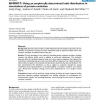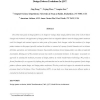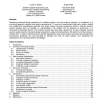1586 search results - page 5 / 318 » Modeling the evolution of operating systems: An empirical st... |
123
Voted
ISESE
2006
IEEE
15 years 7 months ago
2006
IEEE
We consider empirical evaluation of the availability of the deployed software. Evaluation of real systems is more realistic, more accurate, and provides higher level of confidenc...
133
click to vote
BMCBI
2005
15 years 1 months ago
2005
Background: General protein evolution models help determine the baseline expectations for the evolution of sequences, and they have been extensively useful in sequence analysis an...
147
click to vote
SQJ
2010
15 years 7 days ago
2010
One of the main goals of design patterns is to design for change. Many design patterns leave some room for future changes and evolutions. The application of design patterns leads ...
142
click to vote
AC
2002
Springer
15 years 1 months ago
2002
Springer
Measuring structural design properties of a software system, such as coupling, cohesion, or complexity, is a promising approach towards early quality assessments. To use such meas...
110
click to vote
ICSM
2003
IEEE
15 years 7 months ago
2003
IEEE
: The objective of this paper is to identify those factors, which are critical to the success of a maintenance operation in general and to apply them to a particular maintenance pr...



